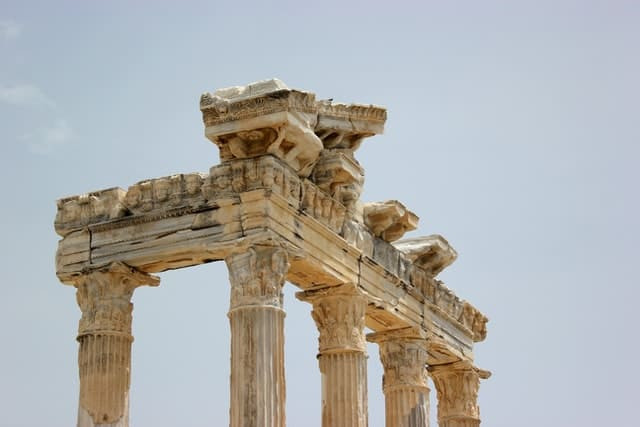
7 min
0
10.04.2022

Let's take a look at Greek Mythology essay sample and see how you can write your essay.
Greek Mythology Essay Sample
Greek Mythology: Origins
Greek Mythology begins in darkness. Nobody truly knows who or what comes first. Some say it was Gaia who birthed Uranus, or Uranos, the Sky Father. Other sources claim that it was Nyx, the shadowy Goddess of the Night, who breathed into being the sky. What we do know, however, is that it was the union of Uranos and Gaia, the coming together of the Sky Father and Earth Mother, that helped bring life to the world.
The Titans, led by Cronos, overthrew the Sky Father, Uranos, and cast him aside, becoming the rulers of the new world. Cronos then married his older sister Rhea, and together, they bore six children - Zeus, Poseidon, Hades, Hera, Demeter, and Hestia. These six were the first generation of Olympians, the Greek gods as we know them. They are so named because they ruled from Mount Olympus after Zeus killed his father Cronos, ending the rule of the Titans once and for all.
Ancient Greek gods were very unlike the God of Abrahamic religions. Most of the time, they did not behave like gods. In fact, it was their humanity, their propensity for making mistakes, that truly defined them. The Olympian gods, in particular, are rather notorious for ravaging the world with their petty jealousies and rivalries.
Before we go any further, it is best to refer to who exactly we mean when we refer to Olympian gods:
- Zeus, god of the Sky
- Poseidon, god of the Sea
- Hera, goddess of women and family
- Demeter, goddess of agriculture
- Athena, goddess of wisdom
- Aphrodite, goddess of love
- Apollo, the Sun
- Artemis, the Moon
- Ares, god of war
- Hephaestus, god of the smiths
- Hermes, the messenger of the gods
- Dionysus, god of revelry
- Hestia, goddess of the hearth
It should be interesting to know that Hades, despite being an offspring of Cronus and Rhea, is not counted among the Olympian gods because his realm, the Underworld, is separate from Mount Olympus. He resides there with his wife, Persephone, and his dog, Cerberus.
Greek Gods and Humans
Where Greek mythology really takes a life of its own is when it tells the stories of these great gods and their interaction with human beings. Ancient Greece was not safe for humans or even those who helped humans in the beginning. Take Prometheus, for example. Though not himself a human, he stole fire and gave it to the fledgling humans to give them a fighting chance. For his efforts, Zeus sentenced him to torture without respite for the rest of time.
Everyday life in ancient Greece, according to the myths, was fraught with dangers. Not only was there war and wildlife to contend with, but the gods' notice was in itself a threat. Zeus fathered lots of demigods on a whole host of women - many times unwilling. Poseidon, perhaps, is the most famous example of this. Forcing himself on a woman inside the temple of Athena led to the furious goddess cursing the woman and turning her into the dreaded Medusa - at least, according to Ovid, the Roman poet of Metamorphoses fame.
The Age of Heroes
Of course, as a direct result of the Greek gods taking such an intimate interest in the lives of human beings, we get the greatest stories ever told. Demigods, children sired by the gods themselves on humans, are champions of humankind as told by the Greek myths. Such greats as Hercules, Perseus, Theseus, and Achilles, famous for their epic feats of bravery and heroism, were all demigods.
However, the lives of these heroes were always shrouded in tragedy. For like their divine parents, they courted the impossible and improbable at every turn, and sometimes, they had no net to fall back on.
Hercules goes mad and commits heinous crimes - murdering his own family. Theseus abandons Ariadne, without whose help he could not have navigated the labyrinth and sailed the Minotaur, is thrown off a cliff and falls to the sea to his death, welcomed back by his father Poseidon. Achilles, famous for his martial prowess and unbridled rage, met his end at the battlefields of Troy. Heroes, without a doubt, but all marked by tragedy - the Greek myths make no play at favoritism. Everyone pays the price for grandiosity.
Everyone, save, for one.
The Most Human of Tales
The tale that began with Homer's Iliad ends in the Odyssey. In many respects, it is a story of great heroism and adventure, of a crew of sailors navigating monsters and sidestepping the temptations of nymphs. But at its core lies a very simple story. That of Odysseus the man, a veteran of the Trojan War, going back home to Ithaca to be with his wife.
The Age of Heroes has passed, and Odysseus is just a man. Not a demigod by any means. Those great champions have fallen one by one in the Trojan War. In the decade after its end, while Odysseus was lost at sea, the house of Atreus has fallen. The divines, while they grace their children, don't seem to be doing so much now. It is in men now that the fate of the world stands. And Odysseus is proof of that.
With nothing but his intellect, he led to the fall of Troy. Armed with nothing but his wits, he escaped cyclopes, Circe's island, and survived the death of all his crew to make it safely back. Courage, determination, and grit - the hallmarks of human greatness, are all shown prominently in him, the most mundane of his peers.
It is with Odysseus that the Greek myths cement their legacy. Though the gods can continually slay one other and given the world some truly amazing champions, it is man, at the end, who must persevere and bring forth a new day.
Analysis Of the Essay
So, in the sample essay above, there are a few things going right.
Frontloaded Information
The very first rule of journalism is to put all the relevant and important data at the very so that the readers can get what they want out of the piece by just reading the beginning. The essay starts with giving the origins of Greek mythology, telling you exactly what you need to know and providing a good starting point. The information you seek is easily accessible. This is something you need to always do.
Clear Timeline
When it comes to pantheons, the timeline is very important. The Olympians weren't always the dominant gods. What came before them? What happened after they rose to power? Without knowing that, we cannot contextualize later stories like the slaying of the Minotaur or even the Iliad and the Odyssey. A clear timeline is needed, and the essay breaks this down into clear segments.
With that being said, there are also a few things that can be improved upon in the essay. These are:
Proper Structure
The essay above tries to follow the basic format for an informative essay: beginning, middle, and ending. While the conclusion is missing entirely, the body of the essay meanders through the timeline for a long time. Some trimming of the body is in order to make it flow more naturally.
Proper Conclusion
The essay lacks a proper ending. All the points covered need to be tied up properly and efficiently, giving the readers a sense of closure and summarising the facts. Remember, the thing that says the longest in a reader's mind is what they read last, so you need to focus and do something like this:
Conclusion
Athens still stands. Troy has been discovered. King Minos might actually have reigned over Crete. There is always a kernel of truth behind every tale, and Greek Mythology seems to be rooted into the very soil of the land that birthed it. Countless people across the ages have been fascinated by the tapestry of tales so woven by the master bards of a bygone era. So much so that every generation requires a contemporary retelling of them.
Why? Because these tales are beautiful. Because they have a human quality that is so often not attributed to supreme beings. Because the Greek gods, at their very core, are alarmingly human. It is what makes them relatable and what makes them interesting.
We hope you got what you needed out of this essay. Studybay helps you create the best essays you will ever submit. Use our essay writing service now to get the best grades you can imagine. Think of it as a gift from the gods themselves!



